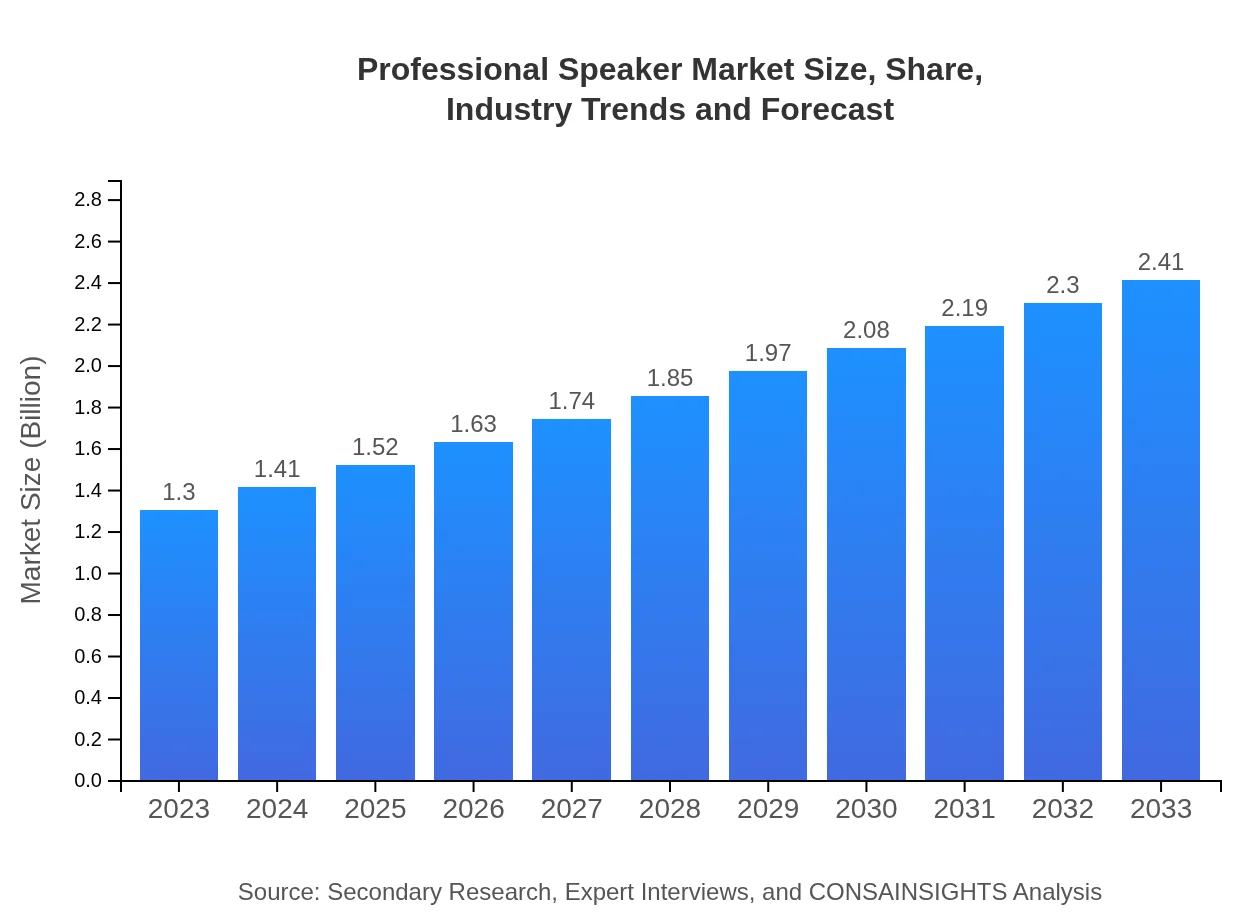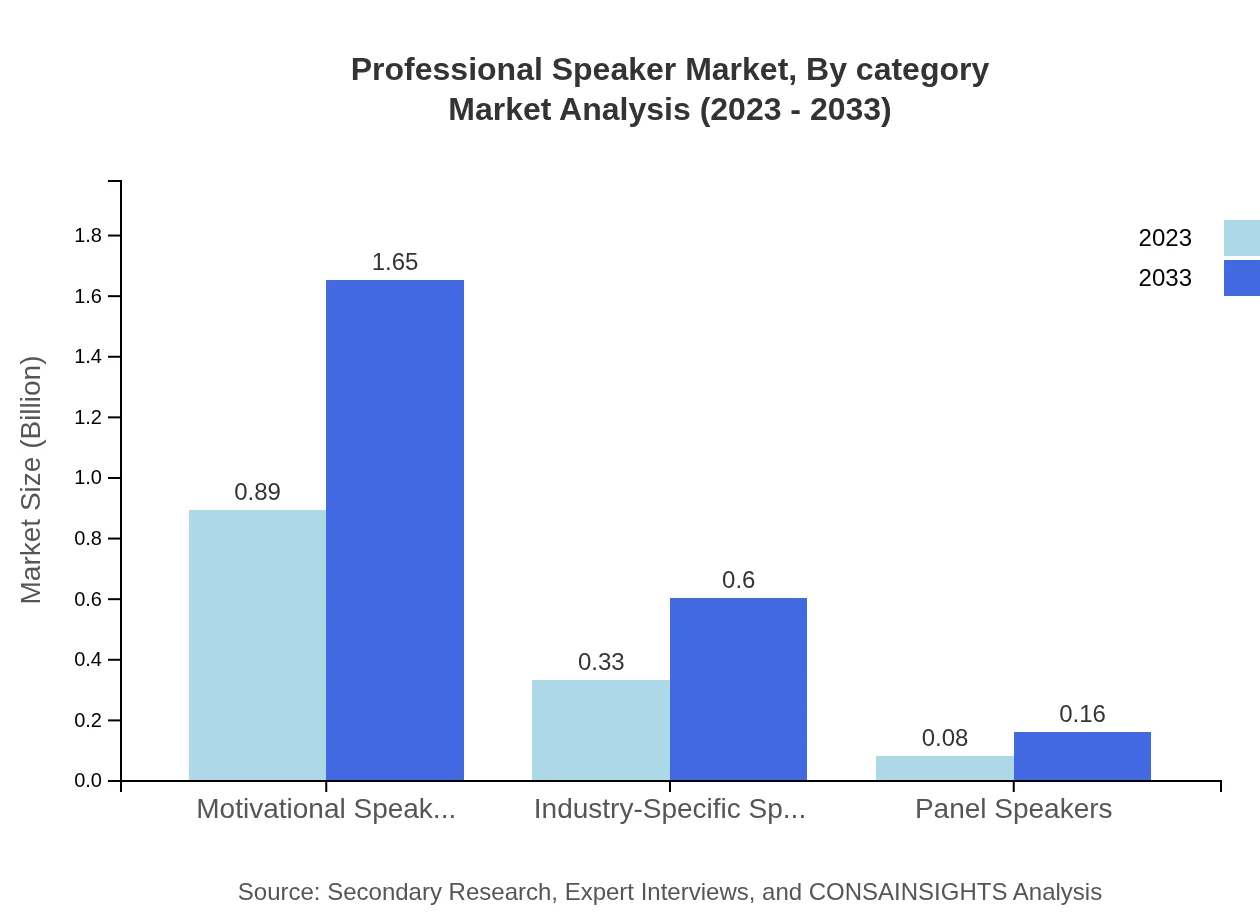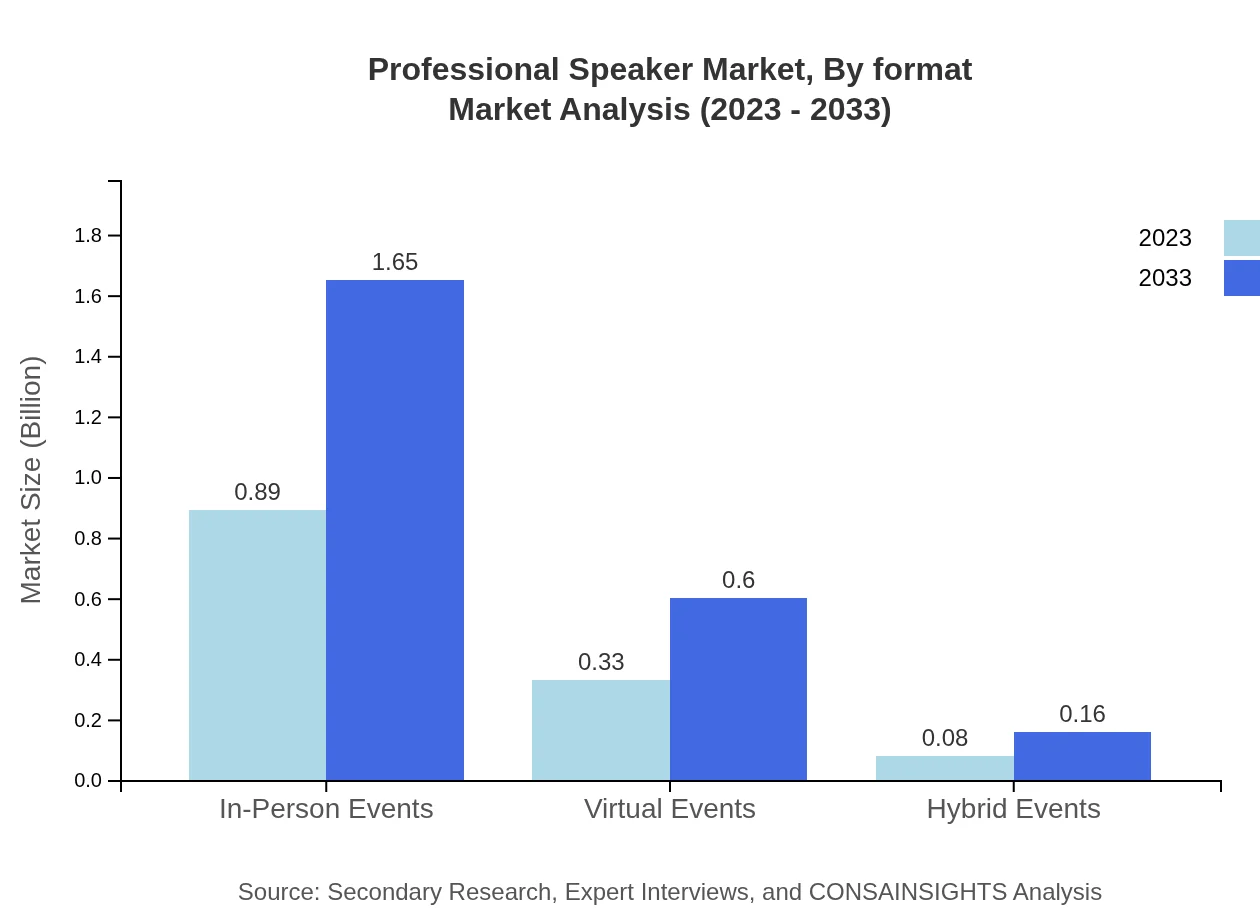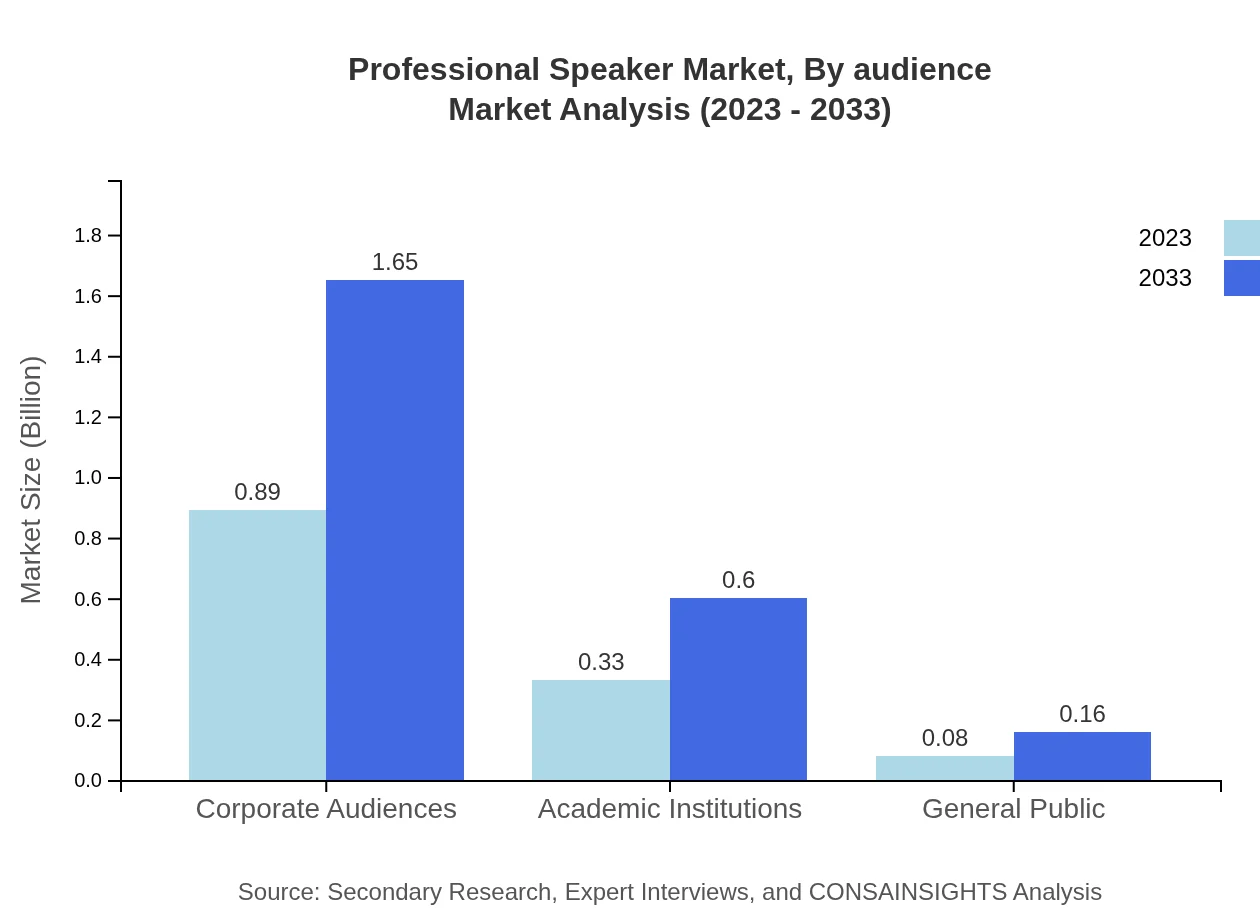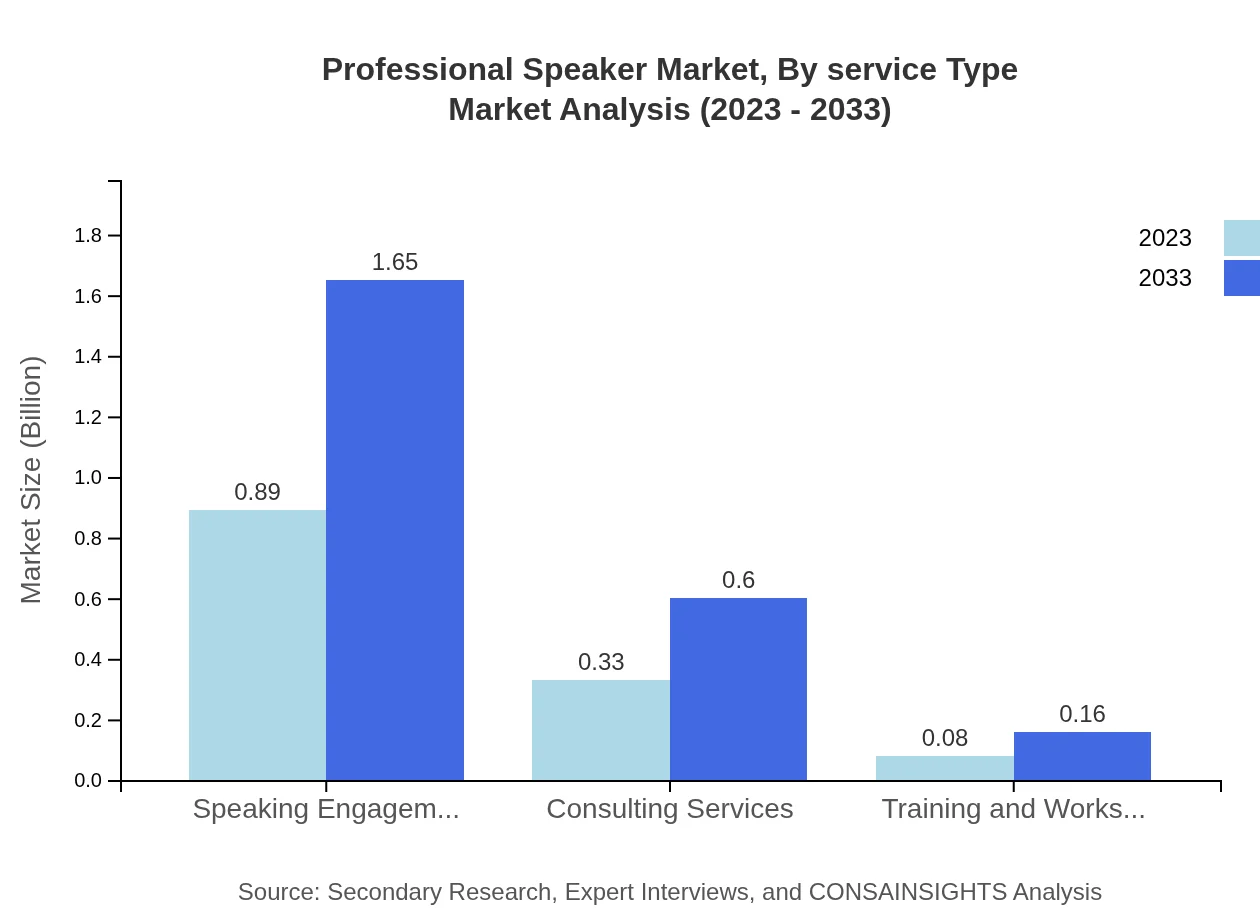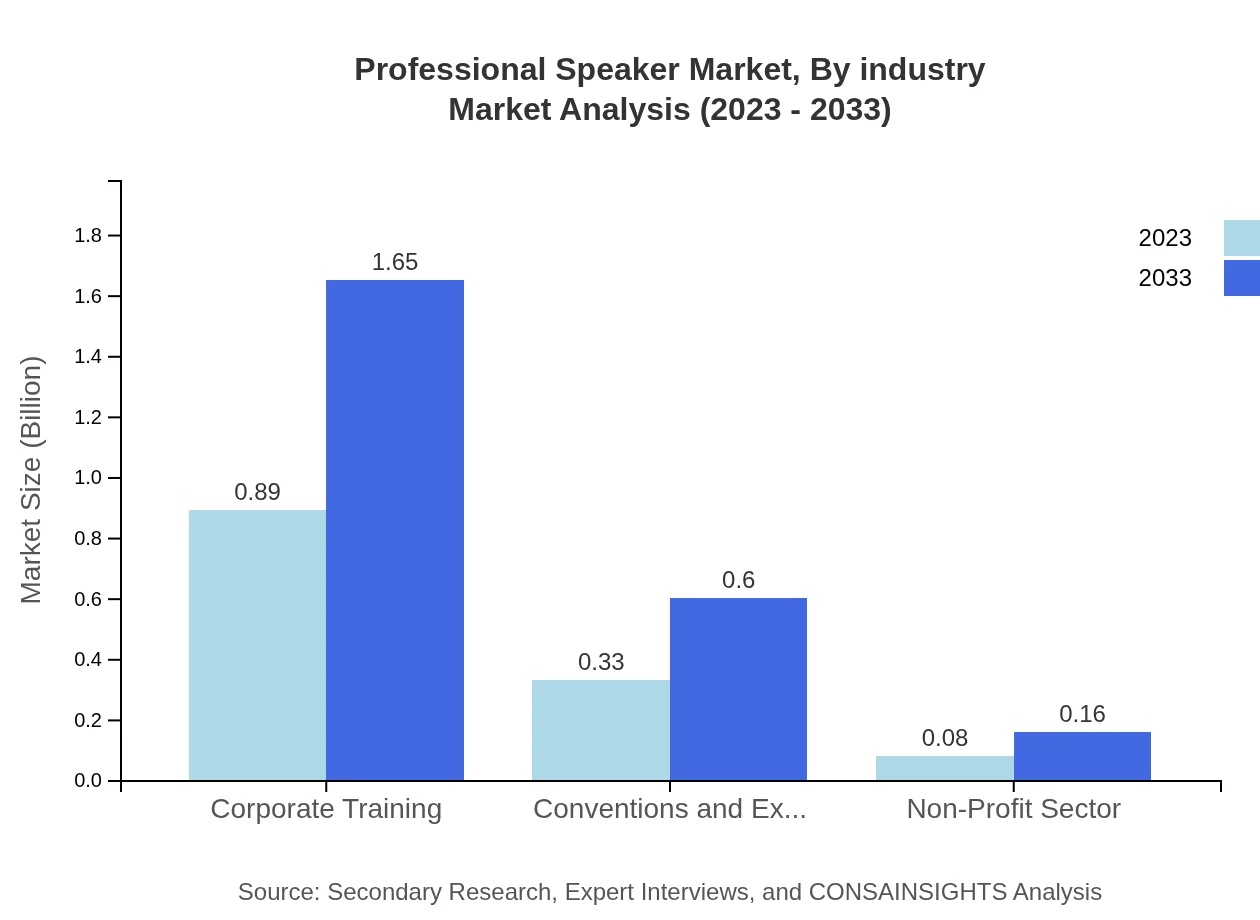Professional Speaker Market Report
Published Date: 31 January 2026 | Report Code: professional-speaker
Professional Speaker Market Size, Share, Industry Trends and Forecast to 2033
This report analyzes the Professional Speaker market, providing insights into market trends, size, segmentation, and regional analysis, covering the forecast period from 2023 to 2033.
| Metric | Value |
|---|---|
| Study Period | 2023 - 2033 |
| 2023 Market Size | $1.30 Billion |
| CAGR (2023-2033) | 6.2% |
| 2033 Market Size | $2.41 Billion |
| Top Companies | Tony Robbins, Brené Brown, Simon Sinek |
| Last Modified Date | 31 January 2026 |
Professional Speaker Market Overview
Customize Professional Speaker Market Report market research report
- ✔ Get in-depth analysis of Professional Speaker market size, growth, and forecasts.
- ✔ Understand Professional Speaker's regional dynamics and industry-specific trends.
- ✔ Identify potential applications, end-user demand, and growth segments in Professional Speaker
What is the Market Size & CAGR of Professional Speaker market in 2023 and 2033?
Professional Speaker Industry Analysis
Professional Speaker Market Segmentation and Scope
Tell us your focus area and get a customized research report.
Professional Speaker Market Analysis Report by Region
Europe Professional Speaker Market Report:
Europe's Professional Speaker market is expected to increase from $0.31 billion in 2023 to $0.58 billion by 2033. The demand for speakers focusing on sustainability, wellness, and innovation is on the rise, supported by events such as industry conferences and trade shows that prioritize leading-edge discussions.Asia Pacific Professional Speaker Market Report:
The Asia Pacific market is forecasted to grow from $0.28 billion in 2023 to $0.52 billion by 2033. The increasing number of corporate events and a burgeoning middle class seeking motivational content are significant drivers of growth in this region. Countries like China and India are investing heavily in skill development, spurring demand for professional speakers.North America Professional Speaker Market Report:
North America remains the largest segment, with the market projected to grow from $0.49 billion in 2023 to $0.91 billion by 2033. The extensive corporate sector's reliance on public speaking for training and engagement along with a high presence of renowned speakers underpins this market's strong performance.South America Professional Speaker Market Report:
In South America, the market is expected to rise from $0.03 billion in 2023 to $0.06 billion by 2033. There is a growing emphasis on corporate training and motivations within organizations, although economic volatility poses challenges to steady growth.Middle East & Africa Professional Speaker Market Report:
The Middle East and Africa region anticipates a growth from $0.18 billion in 2023 to $0.34 billion by 2033. Events leveraging multicultural perspectives and insights related to business challenges in these regions are driving demand for professional speakers, alongside the burgeoning startup environment.Tell us your focus area and get a customized research report.
Professional Speaker Market Analysis By Category
The Professional Speaker market segments by category into motivational speakers, industry-specific speakers, and panel speakers. In-person events dominate with a projected market size of $0.89 billion in 2023 and expected growth to $1.65 billion by 2033, fueled by corporate engagements and workshops. Meanwhile, virtual events are also anticipated to grow significantly, with a market size rising from $0.33 billion to $0.60 billion by 2033.
Professional Speaker Market Analysis By Format
Analysis of market format emphasizes the significant share of in-person engagements at 68.48% in 2023, projected to remain consistent through 2033. Virtual events add another 25.01% share, demonstrating an increasing shift toward convenience and accessibility, while hybrid formats cater to the diverse demands of audiences.
Professional Speaker Market Analysis By Audience
The market by audience segments highlights corporate audiences dominating at 68.48%, closely followed by the academic sector at 25.01%. The growing engagement of the general public in workshops and public speaking events, although smaller at 6.51%, signifies an expanding interest in professional development outside traditional business environments.
Professional Speaker Market Analysis By Service Type
The Professional Speaker market by service includes speaking engagements and corporate training, both estimated to have a size of $0.89 billion in 2023, with growth to $1.65 billion by 2033. Consulting services are also significant, with a market size projected to increase, reflecting greater investments in expertise across various sectors.
Professional Speaker Market Analysis By Industry
Industry-specific segments highlight the necessity of tailored speaking that caters to varied industries. Corporate training sessions dominate, illustrating the value companies place on skilled professionals to enhance employee engagement and inspire productivity, while non-profit and educational sectors are also becoming vital contributors to market growth.
Professional Speaker Market Trends and Future Forecast
Tell us your focus area and get a customized research report.
Global Market Leaders and Top Companies in Professional Speaker Industry
Tony Robbins:
Renowned for his motivational speaking, Tony Robbins has transformed the lives of millions through seminars, coaching, and books, focusing on personal and professional development.Brené Brown:
An acclaimed author and speaker, Brené Brown is celebrated for her insights on vulnerability and leadership, significantly impacting corporate training and personal development.Simon Sinek:
Famous for his concept of 'Start With Why', Simon Sinek partners with organizations to develop leaders and motivate teams to share a vision beyond routine tasks.We're grateful to work with incredible clients.









FAQs
What is the market size of professional Speaker?
The global professional speaker market is currently valued at approximately $1.3 billion, with a projected compound annual growth rate (CAGR) of 6.2% over the next decade, indicating robust growth and increasing demand for speaker services.
What are the key market players or companies in this professional Speaker industry?
Key players in the professional speaker industry include major event management firms, specialized speaker bureaus, and individual notable speakers. They influence trends and set standards through their speaking engagements, educational programs, and partnerships.
What are the primary factors driving the growth in the professional speaker industry?
Growth in the professional speaker industry is driven by increasing corporate investment in training, demand for motivational speaking, and a rise in virtual events. The emphasis on personal development and engagement at events also fuels market expansion.
Which region is the fastest Growing in the professional speaker market?
North America is currently the fastest-growing region in the professional speaker market, projected to grow from $0.49 billion in 2023 to $0.91 billion by 2033, benefiting from a strong corporate culture and event industry.
Does ConsaInsights provide customized market report data for the professional speaker industry?
Yes, ConsaInsights offers customized market report data tailored to specific needs in the professional speaker industry, allowing clients to leverage detailed insights and analytics to make well-informed decisions.
What deliverables can I expect from this professional speaker market research project?
From the professional speaker market research project, you can expect detailed reports, market segmentation analysis, growth forecasts, and actionable insights that inform strategic planning and decision-making for stakeholders.
What are the market trends of professional speaker?
Current market trends in the professional speaker industry include an increasing focus on hybrid event formats, growth in virtual speaker engagements, and the rising popularity of motivational and industry-specific speakers.

